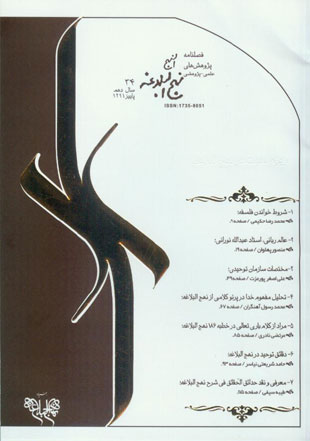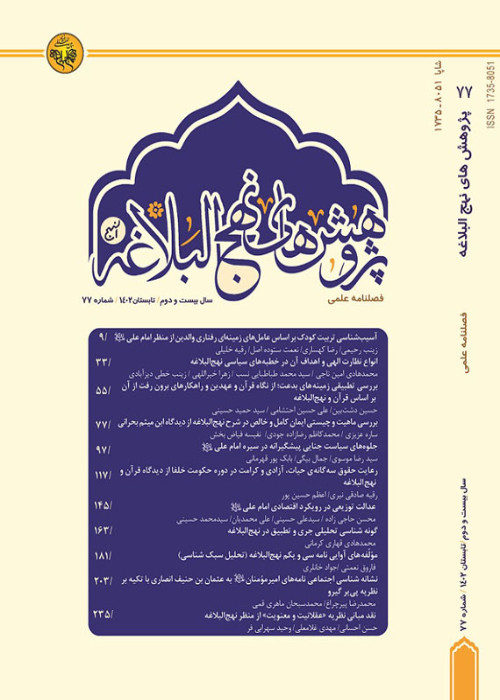فهرست مطالب

نشریه پژوهش های نهج البلاغه
سال یازدهم شماره 2 (پیاپی 34، تابستان 1391)
- 136 صفحه، بهای روی جلد: 40,000ريال
- تاریخ انتشار: 1391/05/10
- تعداد عناوین: 8
-
-
صفحه 5
-
صفحه 9
-
صفحه 19
-
صفحه 93
-
Page 9From ancient time and the time of the glory of philosophy in Greece, there are conditions for studying philosophy. When the man comes to the world of philosophy and faces the ocean of thoughts and understandings and observes the horizons of stormy seas and mystery lands he will come to this point that it’s convenient to put conditions for studying philosophy. As more stormy this sea is, as harder and more dangerous is to pass through it. As more thinking atmospheres and knowledge, disagreements and different outlooks exist as more inaccessible is reaching the truth through these thoughts.
-
Page 49Organization is a set of actions and social relations which follows certain purposes. Tawhid, as the most fundamental principle of true religions, creates a set of actions and social relations belief in which transforms the structure of power and grants a special order to the organization; an order no one is allowed to define and design but almighty God and toward which all are equal and at one level. Thus, monistic organization is purified from humiliation, flattery, hypocrisy, etc. and causes the belief in divine sustenance granting and need of all creatures to the Almighty in such a way that the most beautiful manifestation of equality appears in it. In this sense, monistic organization is organization of justice and manifestation of monistic beauty of creation. The present essay intends to count necessities of development and criterion of monistic organization through delving into concept of tawhid in Imam Ali’s words.Keywords: monistic organization, human mutual rights, rights of managers, the staff, sovereignty of the Almighty, organization of justice, the Almighty's sustenance granting, negation of hegemonic control
-
Page 85The sermon 186 of Nahj al-Balagha is centered around purification of God’s essence and act from creatures’ qualities. On the other hand, God’s definite will to originate something is mentioned in the holy Quran and hadiths as “He says ‘be’ and it becomes,” by which being meant God’s existential will and not legislative speech, revelation, or the holy Quran. Comparison of “speech” in the sermon 186 of Nahj al-Balagha with characteristics of existential and legislative speeches indicates that by kalam in that sermon is meant existential speech. Therefore, those two interpreted kalam there as the holy Quran are mistaken.Keywords: purification of God's act, God's will, existential speech, legislative speech, sermon 186 of Nahj al Balagha
-
Page 93Tawhid is the basis and foundation of all religious teachings and is spoken of a lot in Nahj al-Balagha. That is why multiple works written on Nahj al-Balagha have constantly taken subtle points on Tawhid dealt with in Nahj al-Balagha into consideration. The present essay introduces some such subtle points as divine attributes, limits of knowledge of God, status and share of the intellect and senses in the knowledge of God, distinction of the Creator from the creature, reproaching deliberation upon the Divine essence, and how to praise God being introduced by Imam Ali for the first time.Keywords: Subtle Points on Tawhid, divine attributes, perception of God, the intellect
-
Page 115Being endowed with a great lexical treasury, Imam Ali’s precious words narrated in Nahj al-Balagha are of the highest level of eloquence increasing beauty of his speeches. In addition, they contain a good number of historical facts which reveal so many truths of Islamic history. However, conception of its beauty as well as discovering its eloquence and truths is out of reach of the masses


